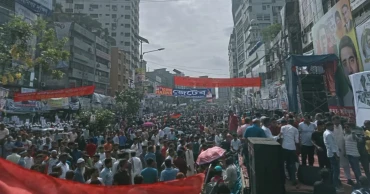Awami League government
31 ousted MPs’ cars among 100 set to be auctioned
Chattogram Customs House has set January 21 to auction more than 100 vehicles, including 31 high-end cars imported by former members of parliament (MPs) from the ousted Awami League government, who had benefited from duty-free privileges.
“These vehicles will be put up for auction on January 21 due to delays in having them released from the port,” Md Sakib Hossain, assistant commissioner at Chattogram Customs House, told UNB on Wednesday.
Titas Gas disconnects illegal lines of Manikganj washing factory
He said over 900 imported cars are currently being held at various locations, including the Chattogram Port car shed, and will be auctioned because of delays in clearance. “Legal complications had prevented earlier auctions, resulting in congestion at port facilities.”
Despite notices being sent to the owners to settle their dues, there has been no response, particularly from former MPs whose cars were imported under the privileged scheme.
Among the 100 vehicles to be auctioned are 31 Land Cruisers, which were imported under the MP quota over various periods.
The reserve price for these luxury cars is set at Tk 9.5 crore each, representing 60% of their estimated value. With additional VAT and taxes, the expected total revenue from these 31 vehicles is estimated to be at least Tk 221 crore.
Other vehicles to be auctioned include five Toyota Harriers, 13 Havals, and a range of Toyota Premio, Noah, and Rav-4, among others. The inventory for the auction has been finalised, and officials are targeting total revenue of Tk 400 crore from the sale.
Following the initiation of the auction process, the owners of 31 cars have cleared their dues by paying fines. However, no former MP has yet responded to settle their vehicles.
ACC sues Shamim Osman, wife, brother-in-law
Md Saidul Islam, deputy commissioner of Chattogram Customs House, said that the inventory for the auction is complete, with at least 50 car values determined. However, around 300 cars left in open sheds at the port have deteriorated due to prolonged delays.
Yakub Chowdhury, general secretary of the Chattogram Customs Bidders Association, mentioned that, in addition to the cars, the Customs House will also sell 30 cement mixer machines and 10 dump trucks that have been stored in the Chattogram Port car shed for a long time.
1 year ago
Govt in limbo as uncertainty, intransigence render administration ineffective
Bangladesh's interim government is grappling with a significant administrative slowdown since assuming power in August.
Ministries, including the Ministry of Public Administration, are facing sluggish work progress, and development projects appear similarly stagnant. An environment of uncertainty and fear is palpable among government officials, which is contributing to the slowdown.
A visit to the Secretariat revealed apprehension among officials across various departments. There is widespread concern regarding transfers or potential reassignment to less desirable roles, particularly among those appointed or promoted during the Awami League government.
As a result, there is little momentum in executing tasks. Several ministries still have secretaries from the previous government, who are also anxious about being made Officers on Special Duty (OSD) or facing enforced retirement.
Meanwhile, eight secretaries, who had been deprived of promotions during the Awami League tenure and have now been reappointed on a contractual basis, are encountering challenges in adjusting to their roles. The current officers who held positions under Sheikh Hasina's administration appear hesitant to fully accept them, which has resulted in slower operational progress. "These new appointments are struggling to match up with others as they return to the administration after long gaps in service," an official noted.
Some key ministries reported that interim government advisers have instructed budget cuts for projects initiated during the previous administration. Advisers are taking time to understand ongoing projects, and in some cases, work has been halted. There are no signs that the interim administration plans to introduce new projects, adding to concerns about the overall development pace.
In addition to project-related delays, various field-level development tasks and social allowances are not being disbursed properly. Complaints have emerged, particularly about pensions for widows, the elderly, and people with disabilities under the Ministry of Social Welfare. Rural development projects under the Ministry of Disaster Management and Relief, such as “Kabita” and “Kabikha”, are also stalled.
Sharmeen S Murshid, adviser to the Ministry of Social Welfare and the Ministry of Women and Children Affairs, attributed the difficulties to resistance from existing government staff. "Whenever a government assumes office, it needs its own team," she remarked at an event this week. "The old team has to step aside for things to function smoothly."
Read: Experts suggest quick reforms in recruitment for transparency in administration
Asif Mahmud Shojib Bhuiyan, adviser to the Ministry of Labour and Employment and the Ministry of Youth and Sports, echoed similar concerns, stating, "A revolution has taken place in our country. After a revolution, things do not function as they did before, yet we are clinging to the previous system. Some members of the administration are creating stagnation through non-cooperation. If needed, the government will consider replacing uncooperative officials."
Acknowledging the stagnant work environment, Nahid Islam, the Information and Broadcasting Adviser, said during a press conference last month, "Yes, there is stagnation in the administration. We are observing this and facing non-cooperation from various places. Hopefully, the stagnation will dissipate soon."
The lack of appointed secretaries in at least seven ministries and divisions further exacerbates the issue. Additional secretaries managing these departments are only performing routine tasks without making any policy decisions, contributing to the overall lack of progress.
Amid this slowdown, officials from various batches who have been deprived of promotions are demanding proper placement in senior positions. At least 100 officials appointed on a contractual basis during the Awami League regime have had their contracts terminated. Conversely, eight officials who had been sidelined during Hasina’s tenure were reappointed as secretaries and subsequently promoted to senior secretary positions.
Among these appointees, Dr Sheikh Abdur Rashid, Md Siraj Uddin Mia, Dr Mokhles-ur-Rahman, Dr M.A. Momen, M.A. Akmal Hossain Azad, Ehsanul Haque, and Dr Nasimul Ghani are now said to have significant control over the administration. In addition, Siddiq Zobair and A.S.M. Saleh Ahmed have been appointed as senior secretaries in the education and land ministries, respectively.
Promotions have been scarce for long-serving officials from other batches, sparking discontent. Some argue that even junior colleagues have surpassed them in rank. Abu Mohammad Yusuf, a retired additional secretary, lamented, "Despite being qualified, I was not made a secretary. Officials who were junior to me have now taken senior positions."
Dr Mokhles-ur-Rahman, Senior Secretary of the Ministry of Public Administration, explained that addressing these issues, which have persisted for over 16 years, would take time. He expressed optimism, saying, "We hope to complete the placement of suitable individuals in all ministries and departments soon, which will then accelerate progress."
Read more:Chaos, instability prevail in public administration as chain of command collapses
The interim government faces significant challenges as it attempts to restore momentum in the administration while managing the demands of marginalised officials and overcoming resistance within the ranks.
1 year ago
Dhaka Airport’s Third Terminal on track for completion this Oct, flights expected from early 2025
The construction of the third terminal at Hazrat Shahjalal International Airport in Dhaka is set to be completed by October this year, with flight operations expected to begin in early 2025, officials from the Civil Aviation Authority of Bangladesh (CAAB) have confirmed.
According to CAAB, the third terminal’s construction is in its final stages and is on track to be completed by the October deadline. The Civil Aviation Authority will take over the terminal from the contractor in October, following which the process of scheduling flights from the new terminal will commence early next year.
Following the fall of the Awami League government on August 5, uncertainty arose over the timely completion of the terminal. However, the interim government soon restored normalcy to the construction process.
The striking design of the third terminal building has drawn attention in the project area, with finishing touches underway both inside and outside the facility.
Read more: Target set for Dhaka Airport Third Terminal's full functionality by December 2024: CAAB Chairman
Air Vice Marshal Md Monjur Kabir Bhuiyan, Chairman of CAAB, recently inspected the progress of the third terminal. He directed the officials and workers involved in the project to ensure timely completion with a high standard of work.
“About 98% of the work on the third terminal has already been completed, and overall progress is satisfactory. I have instructed those involved to finish the remaining tasks promptly,” Air Vice Marshal Monjur told UNB. “We expect all work to be completed by October. After taking over the terminal from the contractor, we will prepare to launch flight operations.”
Consultancy firm Nippon Koei has estimated that around 6,000 skilled workers will be needed for the operation, maintenance, and security of the terminal, with nearly 4,000 of them required for security alone. However, CAAB officials said that it might take a few months to recruit the necessary workforce, meaning the terminal may not be fully operational immediately. Initially, CAAB and Biman Bangladesh Airlines will manage the terminal, with full operations likely to begin in February next year.
Once operational, the third terminal will increase Hazrat Shahjalal International Airport’s passenger handling capacity by an additional 12 million passengers annually. Currently, the airport’s first and second terminals manage between 120 to 130 flights of more than 30 airlines daily, serving around 20,000 passengers. This equates to a capacity of approximately 8 million passengers per year.
The new terminal will add 230,000 square meters of space to the airport, featuring 115 check-in counters, 66 departure and 59 arrival immigration desks, and three VIP immigration desks. It will also include 27 baggage screening machines, 40 security scanners, 12 boarding bridges, 16 carousels, and 11 body scanners.
The construction project, launched by the government in 2017, began on December 28, 2019, with an estimated cost of Tk 21,398 crore. The Japan International Cooperation Agency (JICA) is providing Tk 16,141 crore as a loan, with the remaining funds coming from the Bangladesh government. The construction is being carried out by Japan’s Mitsubishi and Fujita and South Korea’s Samsung.
CAAB officials noted that once completed, the terminal will accommodate 37 aircraft at a time and feature two high-speed taxiways to reduce waiting times on the runway. Two buildings have also been constructed for import and export cargo operations. A three-story parking facility for 1,350 vehicles is nearing completion. Initially, 12 out of the 26 boarding bridges will be operational, with 15 self-service check-in counters and 10 automated passport control counters available for departing passengers.
The terminal has been designed to ensure smooth entry and exit for passengers. It will be connected to the elevated expressway, and airport railway station via a tunnel. Hajj pilgrims will also have a dedicated tunnel from the Ashkona Hajj Camp to the third terminal.
Last year, on October 7, former Prime Minister Sheikh Hasina partially inaugurated the terminal as part of her government’s development efforts ahead of the national elections. At that time, the government had announced that flights would operate from the third terminal by October this year.
Read more: Govt will decide on ground handling at Dhaka airport’s third terminal and Biman is ready: CEO
1 year ago
BNP, like-minded parties to enforce 5th spell of 48-hour blockade from Wednesday
After giving a pause for a day, the BNP and like-minded parties will again enforce a 48-hour countrywide road-rail-waterway blockade beginning from Wednesday (November 15, 2023) to mount pressure on the Awami League government to quit power and hold the next election under a non-partisan administration.
BNP Senior Joint Secretary General Ruhul Kabir Rizvi announced the programme at a virtual press briefing on Monday afternoon.
He said the other opposition parties, who have long been carrying out the simultaneous movement with BNP, also observe a similar programme.
Read: BNP-Jamaat's blockade: 189 BGB platoons deployed across the country
Rizvi said the blockade programme will be observed from 6am Wednesday to 6am Friday across the country. It will be the fifth phase of the blockade programme of the opposition parties.
The BNP leader said their ongoing blockade was successful with the spontaneous support of the country’s people.
He thanked the leaders and activists of BNP and like-minded parties to make the blockade programme a success.
The fresh agitation was announced around 14 hours before the end of the opposition’s 48-hour nationwide blockade that was enforced at 6am on Sunday. The ongoing blockade has been marked by widespread incidents of violence, including torching and vandalising vehicles.
Read: The ones bearing the brunt of blockades
BNP and other opposition parties, including Jamaat-e-Islami, have been enforcing blockades across the country in fourth phases since Oct 31.
They also observed a nationwide dawn-to-dusk hartal on Oct 29 in protest against the attacks on BNP’s grand rally at Nayapaltan that ended amid the incidents of torching vehicles and clashes, leaving three people dead.
Half an hour into the start of BNP's much-talked-about grand rally at Nayapaltan on October 28, BNP leaders and workers locked in a clash with the ruling party activists and police at Kakrail. Soon violent clashes spread around Nayapaltan, foiling the rally midway.
Read more: Day 2 of 4th blockade called by BNP, Jamaat underway
2 years ago
3-day blockade: 16 arson attacks till this morning, says Fire Service
At least 16 incidents of arson took place across Bangladesh in over 24 hours till this morning (November 01, 2023) during the road, rail and waterway blockade enforced by the BNP, Jamaat and its allies.
Sources at the media cell of Fire Service and Civil Defence headquarters said that they got information of 16 arson attacks across the country.
The reports of fire incidents reached the fire service control room from 6 am yesterday till 9 am today.
No long route buses leave from Ctg on first day of blockade: 14 held
Among the arson attacks, four occurred in Dhaka city (Postogola, Khilgaon, Baridhara), six in Dhaka division (Savar, Gazipur), three each in Chattogram (Karnaphuli, Rangunia) and Rajshahi (Bogura, Sirajganj) divisions.
Nine buses, two covered vans, two trucks, one pick-up van, two commercial product showrooms and one police box were burned, fire department's media cell said.
AL holding marches, sit-ins on streets protesting BNP-Jamaat’s blockade
A three-day blockade of road, rail and waterways, enforced by BNP, Jamaat and like-minded opposition parties, began on Tuesday (October 31, 2023) to mount pressure on the Awami League government to quit and hold the next election under a non-party, neutral administration.
Countrywide blockade: Long-route bus services from Khulna suspended
2 years ago
Opposition parties’ 3-day countrywide blockade underway
A three-day blockade of road, rail and waterways, enforced by BNP and like-minded opposition parties, across the country began this morning to mount pressure on the Awami League government to quit and hold the next election under a non-party, neutral administration.
Bangladesh Jamaat-e-Islami also enforced the blockade simultaneously from this morning to Thursday evening with the same demands.
Apart from BNP and Jamaat, the 12-party alliance, Jatiyatabadi Samamona Jote, LDP, Gonoforum and People’s Party, Gonotantrik Bam Oikya, Gono Odhikar Parishad, Labour Party and NDM are also observing the programme separately.
Meanwhile, AL has vowed to resist any violence during the blockade.
Read more: Jamaat to observe countrywide blockade program on Oct 31 and Nov 1-2
Police and other law enforcement agencies have already alerted their units to increase vigilance and beef up security across the country.
Police have also taken up positions and set up checkpoints at the entry points and all major points of Dhaka.
After observing a day-long hartal, BNP Senior Joint Secretary General Ruhul Kabir Rizvi on Sunday evening announced the countrywide blockade for three consecutive days.
He, however, said vehicles of newspapers or media, ambulances and vehicles transporting oxygen cylinders and medicines will remain out of the purview of the three-day blockade.
Read more: BNP sends letter to foreign missions blaming govt, police for Oct 28 violence
2 years ago
Stay alert against plot for violence to shift blame on to BNP, its allies: Fakhrul
BNP Secretary General Mirza Fakhrul Islam Alamgir on Saturday (September 09, 2023) urged everyone to remain alert as the government is plotting to carry out violence and communal attacks to shift the blame onto opposition parties.
"They (govt) are conspiring. It won’t work, no matter how much plot they hatch,” he told a rally at Nayapaltan after the party’s two mass processions.
As part of that plot, the BNP leader said his ruling party counterpart Obaidul Quader talked about violence and communal attacks two days ago.
“By making such attacks by Awami League, they (government) will try to put the blame on the opposition parties. That's why everyone should stay alert,” he warned.
Read more: BNP, like-minded parties set to hold mass processions in Dhaka Saturday
Fakhrul said the government has no strength to resist the people who took to the streets to ensure its fall.
“We must take to the streets with more courage to defeat this demonic government,” he told the opposition leaders and workers.
The BNP leader said people from all walks of life, including farmers, labourers and hardworking people, regardless of their party affiliation, have got united to unseat the Awami League government through a united movement.
“You’re going through suffering in the rain. You have to endure more pains and suffering in the days to come to establish a people's government through a credible election under a truly neutral non-partisan government by defeating the current regime,” he said pointing at the opposition followers.
Read more: Polls experts, politicians say political parties should resolve differences over next elections
2 years ago
Thousands of BNP leaders, activists gathering at Dhaka’s Nayapaltan to join grand rally
Thousands of leaders and activists of BNP have started gathering in front of the party’s Nayapaltan central office since Friday morning to attend their grand rally.
Defying senior leaders’ instructions, several thousand activists thronged Dhaka’s Nayapaltan area on Thursday night and stayed there overnight.
Visiting the rally venue around 10:30 am on Friday, the UNB correspondent saw thousands of party leaders and followers from different parts of the city arriving in processions.
Also read: BNP gears up for Friday's anti-govt rally amid fear, speculations
Carrying banners, festoons, placards and portraits of the party’s top leaders, they were shouting anti-government slogans.
Roads and alleys stretching from Bijoynagar to Nayapaltan were crowded with BNP activists, halting traffic in the area.
Many leaders and activists of the party alleged that they had to face checking by law enforcement agencies at the entry points of the capital.
The party has already set up a big stage on nine trucks, rolled out red carpets, and installed loudspeakers.
Also read: Ground for grand rally of Awami League's associate organisations is being ready
Two separate stages have also been erected for the cultural activists and journalists.
Artistes from the BNP's cultural body are performing patriotic songs to keep the crowds invigorated under the scorching sun and they will continue till 12 pm.
BNP’s Dhaka south and north city units are organizing the rally to press home the opposition’s one-point demand for holding the upcoming national election under a non-party government.
The rally is scheduled to formally begin at 2 pm after Juma prayers.
Also read: Over 500 leaders, activists arrested in Dhaka ahead of grand rally: BNP
BNP Secretary General Mirza Fakhrul Islam Alamgir will address the programme as the chief guest and announce their next course of action to mount pressure on the current government to accept their one-point demand.
Apart from BNP, 37 like-minded political parties and alliances are also going to arrange separate rallies in different city areas to press home the one-point demand that includes the resignation of the Awami League government and holding the next election under a neutral government.
Besides, three associate bodies of the ruling Awami League—Jubo League, Swechchasebak League and Chhatra League—are also scheduled to hold a rally in front of the south gate of Baitul Mukarram mosque which is 1.7 km away from the BNP’s rally at Nayapaltan.
The rallies of the ruling and opposition parties were scheduled to be held on Thursday, but they rescheduled their programmes for Friday as Dhaka Metropolitan Police authorities did not allow them to use their chosen venues on a workday for the sake of avoiding public suffering.
Also read: BNP, AL associate bodies get permission for rallies at Nayapaltan, Baitul Mukarram on conditions
Political analysts think it will be a daunting task for the law enforcers to maintain peace and fend off any untoward incident as both the opposition and the ruling parties will hold their programmes at short distances and at the same time.
All eyes are on the BNP rally as there are speculations that the party may announce non-stop action programmes to force the Awami League government to step down.
On Thursday, Dhaka Metropolitan Police gave BNP and Awami League’s three associate bodies permission to hold their rallies at Nayapaltan and Baitul Mukarram respectively on 23 conditions.
The police authorities asked BNP to limit their rally from Kakrail’s Nightingale crossing to Rajarbagh Police Hospital, while the AL associate bodies have to restrict their rally from Mahanagar Natya Mancha to Muktangan.
2 years ago
Criticise for country's welfare, not to damage it: PM Hasina tells journalists
Bangladesh's Prime Minister Sheikh Hasina on Monday (July 10, 2023) asked the media to do constructive criticism for the welfare of the country, not for damaging it.
"The criticism should be for the welfare of the country and not for damaging it," she said while addressing a function at her office here in the city.
In the function, the premier distributed cheques of financial assistance to the families of dead, sick, insolvent and injured journalists.
This year some Tk 3.46 crore were given against 438 journalists as financial assistance from Bangladesh Journalists Welfare Trust (BJWT) Fund.
Read more: Fast-evolving tech may pose ‘unprecedented crises’ if journalists aren’t prepared: World Journalists Conference
Hasina said the Awami League government has ensured freedom of media in the last 14 years. "None had ever enjoyed so much freedom in the past," she said.
The PM asked the media to do criticism as much as required to correct the government but not to hamper the ongoing progress of the country.
"We don't want that the progress of Bangladesh ti be hampered," she said.
She said the media will have to have the sense of responsibility and dutifulness towards the country and the nation while they enjoy freedom.
The BJWT fund was formed in 2014 with the seed money of Tk 25 crore provided by the prime minister on two occasions.
Read more: Assault on on-duty journalists an unpardonable crime: GM Quader
So far some Tk 40 crore was distributed among 13,510 journalists from the fund.
Information and Broadcasting Minister Hasan Mahmud presided over the function, while Information Secretary Humayun Kabir Khandaker spoke on the occasion.
The Prime Minister said her government allowed private sector to run television channels when she came to power in 1996 and then gave licenses of many television channels to generate employment.
She said her government is going to bring the private television channels under a wage board.
She called upon the media owners to donate money to the Bangladesh Journalist Welfare Trust.
Sheikh Hasina said her government can take arrangements so that the journalists can buy lands or flats making payment in installments.
She said they have taken housing projects to bring landless people under the scheme free of costs following the footsteps of the Father of the Nation.
Taking a swipe at critics of quick rental power plants, she said how could Bangladesh witness so much development unless Tk 90,000 crore was not given to the quick rental power plants.
The BJWT fund was formed in 2014 with the seed money of Tk 25 crore provided by the prime minister on two occasions.
So far some Tk 40 crore was distributed among 13,510 journalists from the fund.
Information and Broadcasting Minister Hasan Mahmud presided over the function, while Information Secretary Humayun Kabir Khandaker spoke on the occasion.
2 years ago
Glimpses of ‘Smart Bangladesh’ in remote Panchagarh areas
The world for people of remote areas in the northern district, Panchagarh, has changed in just 15 years.
They are now enjoying cashless services, which makes life much easier.
People living in remote areas of Panchagarh are utilising the opportunities of ‘Digital Bangladesh’, a campaign initiated by Prime Minister Sheikh Hasina in 2009.
The success of transforming Bangladesh into ‘Digital Bangladesh’ has created the solid ground to move towards a ‘Smart Bangladesh’, which was announced by the Prime Minister recently.
The government has set four bases — smart citizens, smart economy, smart government and smart society — to make the country 'Smart Bangladesh'.
Read:Daily transaction of MFS crosses Tk3200 crore: BB
The aim: every citizen will be skilled in using technology, economic activities will run through using technology, and the government will be technologically smart.
What was unthinkable before 2009 is now the reality for people in remote Panchagarh, as they are getting over 20 important services at home without any hassle from union parishads.
While visiting the Panchagarh Sadar Union Parishad complex, local businessman Abdullah Al Faruque, who is a beneficiary, said that he has received his required trade license by just providing his NID number.
“This cashless system is facilitating any person to get his/her desired document by just providing the NID number to the system as the officials can easily verify all relevant information,” he said.
The concerned official provided him the trade license within 2-3 minutes after matching the required information from his NID.
Read: MFS transactions record breached again in April; number of accounts now 26.5 crore
“We’ve eliminated waste of time and money which was unavoidable in the past,” Faruque said.
This transformation began more than 14 years back when the Prime Minister envisioned advancing the country into a developed one by 2041.
Taking advantage of the Digital Bangladesh initiative, Panchagarh district administration tookthe measures to make their services technology dependent.
Digital transactions are now being used to provide services, which have reduced time, cost and travel difficulties alongside offering better services.
Due to initiatives of the Awami League government, these necessary services are being availed quickly and MFS (mobile financial service) has also made it easier. As a result, revenues of the government have increased, the hassles have been reduced, and the desired service has become available.
Read more: BFIU suspends cash out from 230 MFS accounts over transactions through hundi
Latifa Banu, another beneficiary, said that she has been receiving maternity allowance over last two years and collecting the allowance from the UP for one-and-a-half years.
“Earlier, I had to go to different shops, but now, I am just providing my fingerprint and receiving my allowance easily from the UP centre,” she said.
Halima Begum, who came to Panchagarh Sadar Union Parishad to collect the citizenship certificate, said that it was not so easy before.
She mentioned that after obtaining a certificate from the Union Parishad, there was the trouble of getting signatures on it. A person had to come to collect his/her certificate.
“Now, if you apply with the number of the NID card, the signed certificate will be issued. I like this system,” she said.
Read more: Budget will help to build Smart Bangladesh: Speakers
Panchagarh entered the cashless era when this service was first introduced in the Tirnoihat union of Tetulia. With this, the union parishad of the upazila was on its way to become ‘Smart Bangladesh’.
Cashless services were later introduced to other UPs. The beneficiaries can avail 20 services easily from there. People are now getting the services by visiting the uniontax.gov.bd website from the comfort of their homes.
Deputy Commissioner Md. Jahurul Islam said that over 70,000 people of 43 union parishads and three municipalities in the district have received services from uniontax.gov.bd and pouroseba.gov.bd platforms.
An entrepreneur of Union Digital Center said that online service was launched experimentally in Tetulia upazila in the fiscal year 2019-20, but on January 6 this year, the service started in Tirnoihat UP of Tetulia upazila through the inauguration of cashless service.
Before introducing the platform, any service seeker had to visit the union parishad three times, requiring 7-15 days, on average. But, in the digital and cashless system, he/she doesn’t even need to visit UP.
Read more: Budget is inconsistent with goals of Smart Bangladesh: Speakers
The deputy commissioner said that after the introduction of the Digital Union Cashless Service, revenue is being deposited directly into the UP’s bank account.
He said the local government system is strengthened through cashless services and this is another step towards the making of ‘Smart Bangladesh’.
2 years ago



















